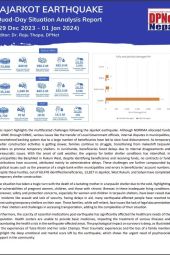Jajarkot Earthquake : Quad-Day Situation Report (29 Dec 2023 -1 Jan 2024)
Summary
This report highlights the multifaceted challenges following the Jajarkot earthquake. Although NDRRMA allocated funds to LDMC through DDMC, various issues like the transfer of Local Government officials, internal disputes in municipalities, overwhelmed banking system due to a large number of beneficiaries have led to slow fund disbursement. As temporary shelter construction activities is getting slower, families continue to struggle, transitioning from makeshift tarpaulin shelters to promise temporary shelters. In Junichande, beneficiaries faced delays due to internal disagreements and bureaucratic issues. With the onset of cold weather, the urgency for better shelter conditions has intensified. In municipalities like Banphikot in Rukum West, despite identifying beneficiaries and receiving funds, no contracts or fund distributions have occurred, attributed mainly to administrative delays. These challenges are further compounded by logistical issues such as the presence of a single bank within municipalities and errors in beneficiaries' account numbers. Despite these hurdles, out of 60,478 identified beneficiaries, 13,827 in Jajarkot, West Rukum, and Salyan have completed temporary shelter construction.
The situation has taken a tragic turn with the death of a lactating mother in a tarpaulin shelter due to the cold, highlighting the vulnerabilities of pregnant women, children, and those with chronic illnesses in these inadequate living conditions. Moreover, safety and protection concerns, especially for women and children in tarpaulin shelters, have been raised due to incidents like assault and lack of security. Facing delays in aid, many earthquake-affected people have resorted to constructing temporary shelters on their own. These families, while self-reliant, face issues like lack of legal documentation for their shelters and challenges in accessing transportation, adding to the complexities of their situation.
Furthermore, the scarcity of essential medications post-earthquake has significantly affected the healthcare needs of the population. Health centers are unable to provide basic medicines, impacting the treatment of various illnesses and exacerbating the health crisis in the earthquake-affected areas. The psychological impact on survivors is deep, as illustrated by the experiences of Tulsa Khatri and her sister Champa. Their traumatic experiences and the loss of a family member highlight the deep emotional and mental scars left by the earthquake, which shows the urgent need of psychosocial support in the community.
Categories:
DPNet Publication
Published Year:
2023
